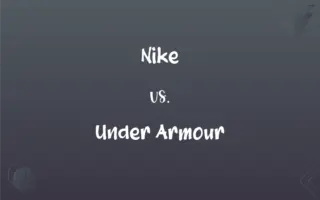Polysulfide Sealant vs. Polyurethane Sealant: What's the Difference?
Edited by Aimie Carlson || By Harlon Moss || Published on February 13, 2024
Polysulfide sealants are rubbery, resistant to chemicals and water, ideal for fuel tanks and pools; polyurethane sealants are tough, flexible, good for construction and automotive uses.

Key Differences
Polysulfide sealants, known for their chemical and water resistance, are ideal for sealing fuel tanks and swimming pools. Polyurethane sealants, on the other hand, are valued for their strength and flexibility, making them suitable for construction and automotive applications.
In terms of durability, polysulfide sealants excel in harsh environments and have a long lifespan. Polyurethane sealants, while also durable, are more suited to environments where weather resistance and flexibility are crucial.
Polysulfide sealants have excellent resistance to oils, solvents, and other harsh chemicals. Polyurethane sealants, though resistant to chemicals, are more commonly chosen for their ability to adhere to a wide range of materials.
The curing process of polysulfide sealants is longer, making them less ideal for quick application. Polyurethane sealants cure faster, which is beneficial in rapid-paced construction projects.
For applications requiring a high degree of flexibility, such as in movement joints, polysulfide sealants are less suitable compared to the more flexible polyurethane sealants.
ADVERTISEMENT
Comparison Chart
Chemical Resistance
Excellent resistance to chemicals and solvents
Good chemical resistance, varies by formulation
Durability
High durability, especially in harsh environments
Durable with good weather resistance
Flexibility
Less flexible, suitable for static joints
Highly flexible, ideal for dynamic joints
Curing Time
Longer curing time
Faster curing time
Ideal Use Cases
Fuel tanks, swimming pools, marine applications
Construction, automotive, movement joints
ADVERTISEMENT
Polysulfide Sealant and Polyurethane Sealant Definitions
Polysulfide Sealant
A sealant that adheres well to masonry and concrete, resistant to immersion.
The concrete water tank was coated with polysulfide sealant.
Polyurethane Sealant
A sealant used in automotive applications for its vibration resistance.
Polyurethane sealant was chosen for the car's windshield due to its shock-absorbing properties.
Polysulfide Sealant
A rubbery sealant ideal for environments exposed to solvents and oils.
The fuel tanks were sealed with polysulfide sealant for its oil resistance.
Polyurethane Sealant
A weather-resistant sealant ideal for exterior applications.
The outdoor deck was sealed with polyurethane sealant to withstand weather changes.
Polysulfide Sealant
A long-lasting sealant used in marine and industrial applications.
For the ship's deck, polysulfide sealant was chosen for its durability.
Polyurethane Sealant
A quick-curing sealant suitable for fast-paced building projects.
For the rapid construction project, polyurethane sealant was preferred for its quick curing.
Polysulfide Sealant
A sealant that resists chemicals and water, suitable for immersions.
Polysulfide sealant is used in the construction of swimming pools.
Polyurethane Sealant
A versatile sealant known for its strength and flexibility in construction.
Polyurethane sealant was used to seal the expansion joints in the bridge.
Polysulfide Sealant
A sealant used in applications where long-term chemical resistance is needed.
Polysulfide sealant was applied in the chemical plant for its resistance properties.
Polyurethane Sealant
A durable sealant that adheres to a wide range of materials.
The window frames were sealed with polyurethane sealant for a weatherproof finish.
FAQs
Where are polysulfide sealants typically used?
They are commonly used in swimming pools, fuel tanks, and marine environments.
What are polysulfide sealants?
Polysulfide sealants are chemical and water-resistant sealants used in industrial and marine applications.
How resistant are polysulfide sealants to chemicals?
Polysulfide sealants offer excellent resistance to chemicals and solvents.
Do polysulfide sealants adhere well to concrete?
Yes, they adhere well to masonry and concrete surfaces.
Where are polyurethane sealants typically used?
They are widely used in construction, automotive industries, and for sealing movement joints.
Are polyurethane sealants suitable for quick projects?
Yes, due to their faster curing time, they are ideal for rapid-paced projects.
How long do polysulfide sealants last?
They have a long lifespan, especially in harsh environments.
Can polysulfide sealants be used in dynamic joints?
They are less suitable for dynamic joints due to lower flexibility.
What are polyurethane sealants?
Polyurethane sealants are versatile sealants known for their strength, flexibility, and weather resistance.
Can polyurethane sealants be used on a variety of materials?
Yes, they adhere to a wide range of materials, including wood, metal, and plastics.
How quickly do polyurethane sealants cure?
They typically have a faster curing time compared to polysulfide sealants.
How does polyurethane sealant perform in outdoor conditions?
Polyurethane sealant performs well outdoors, offering good weather and UV resistance.
Are polyurethane sealants flexible?
Yes, they are highly flexible, making them suitable for joints that experience movement.
Is polysulfide sealant easy to apply?
Its application can be more complex due to a longer curing time.
Can polysulfide sealants be used in fuel tank sealing?
Yes, they are often used in fuel tanks for their resistance to oils and solvents.
Are polyurethane sealants environmentally friendly?
The environmental friendliness varies based on the formulation and application.
Are polysulfide sealants suitable for pool repairs?
Yes, they are ideal for swimming pool repairs due to their water and chemical resistance.
Do polysulfide sealants require a primer?
They may require a primer on certain surfaces for better adhesion.
Can polyurethane sealant be used in automotive applications?
Yes, it's commonly used in automotive for its vibration and shock resistance.
How do polyurethane sealants react to temperature changes?
They generally handle temperature changes well, maintaining their integrity.
About Author
Written by
Harlon MossHarlon is a seasoned quality moderator and accomplished content writer for Difference Wiki. An alumnus of the prestigious University of California, he earned his degree in Computer Science. Leveraging his academic background, Harlon brings a meticulous and informed perspective to his work, ensuring content accuracy and excellence.
Edited by
Aimie CarlsonAimie Carlson, holding a master's degree in English literature, is a fervent English language enthusiast. She lends her writing talents to Difference Wiki, a prominent website that specializes in comparisons, offering readers insightful analyses that both captivate and inform.






































































